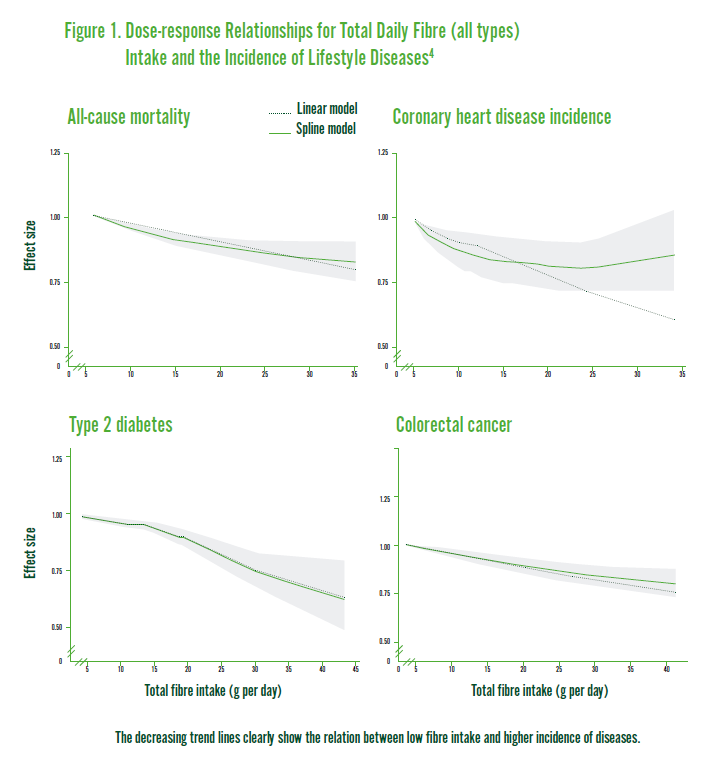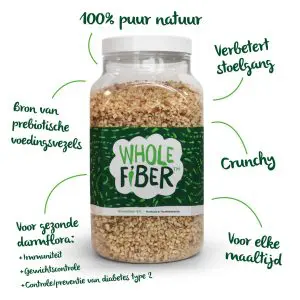The health benefits of prebiotic fibers such as WholeFiber
A prebiotic is ‘a substrate’ (e.g. dietary fiber, polyphenol) that is selectively utilized by host microorganisms leading to a health benefit (1). Prebiotic fibers and polyphenols are present in vegetables, fruit and legumes. Prebiotics stimulate the growth of certain (good) bacteria in our intestines, specifically in the colon.
Those bacteria convert the fiber into short-chain fatty acids such as acetate, propionate and butyrate. These compounds (notably butyrate) are the main source of nutrition and energy for colonic cells (2), and:
- are essential for the vitality of our gut microbiome and gut lining.
- play an important role in regulating our immune system
- are instrumental in preventing inflammatory intestinal diseases, obesity, prediabetes, high blood pressure, and derived diseases.
Reducing the risks of lifestyle diseases and mental wellbeing issues/depression
Several clinical studies show that there is a clear relationship between ingesting enough prebiotic fibers and reducing the risks of the previously mentioned lifestyle diseases and mental wellbeing issues/depression. Other studies show that adequate prebiotic fiber intake improves various functions of the gut microbiome.
- Higher daily prebiotic fiber consumption contributes to increased production of short-chain fatty acids, increased bile acids and gut satiety hormones secretion and the adsorption of vitamins and minerals (3), resulting in more healthy microbiome compositions, reduced food intake, more frequent and easy bowel movements and improving the resilience of the immune system.
- In 2019, the leading medical journal The Lancet published two papers on the health benefits of dietary fiber. The studies analyzed the results of a large number of clinical trials. The analysis clearly shows that higher fiber consumption, up to about 30 grams per day, reduces the risk of developing diseases such as type 2 diabetes, cardiovascular disease, stroke and certain type of cancers (4, 5) by 15-30%; see figure below.
- Prebiotic fiber may also play a role in slowing the growth of atherosclerosis, reducing clotting of platelets, modulating the lipid profile and lowering blood pressure (6).

Increase your prebiotic fiber intake with WholeFiber
WholeFiber is a natural and unique source of prebiotic fibers which can help people consume higher amounts of fiber. WholeFiber is an 100% natural ingredient created from dried chicory root, with a prebiotic fiber content of over 85%.

References
1 Gibson GR, Hutkins R, Sanders M, Prescott SL et al. Expert consensus document: The International Scientific Association for Probiotics and Prebiotics (ISAPP) consensus statement on the definition and scope of prebiotics. Nat Rev Gastroenterol Hepatol 14: 491–502 (2017). doi:10.1038/nrgastro.2017.75
2 Parada Venegas D, De la Fuente MK, Lansdkron G, Gozales MJ et al – Short chain fatty acids (SCFAs)-mediated gut epithelial and immune regulation and its relevance for inflammatory bowel diseases (2019) Front Immunol 10: 27. doi: 10.3389/fimmu.2019.00277
3 Parnell JA, Reimer RA (2012) Prebiotic fiber modulation of the gut microbiota improves risk factors for obesity and metabolic syndrome. Gut Microbes 3:29-34. doi:10.4161/gmic.19246
4 Reynolds A, et al., 2019 – Carbohydrate quality and human health: a series of systematic reviews and meta-analyses. The Lancet 393: 434–445. https://doi.org/10.1016/S0140-6736(18)31809-9
5 O’Keefe, S (2019) The association between dietary fibre deficiency and high-income lifestyle-associated diseases: Burkitt’s hypothesis revisited. Lancet Gastroenterol Hepatol 4: 984-996. doi: 10.1016/S2468- 1253(19)30257-2
6 Kaye DM, Shihata WA, Jama HA, Tsyganov K et al (2020) Deficiency of prebiotic fiber and insufficient signaling through gut metabolite-sensing receptors leads to cardiovascular disease. Circulation 141:1393-1401. doi: 10.1161/CIRCULATIONAHA.119.043081

